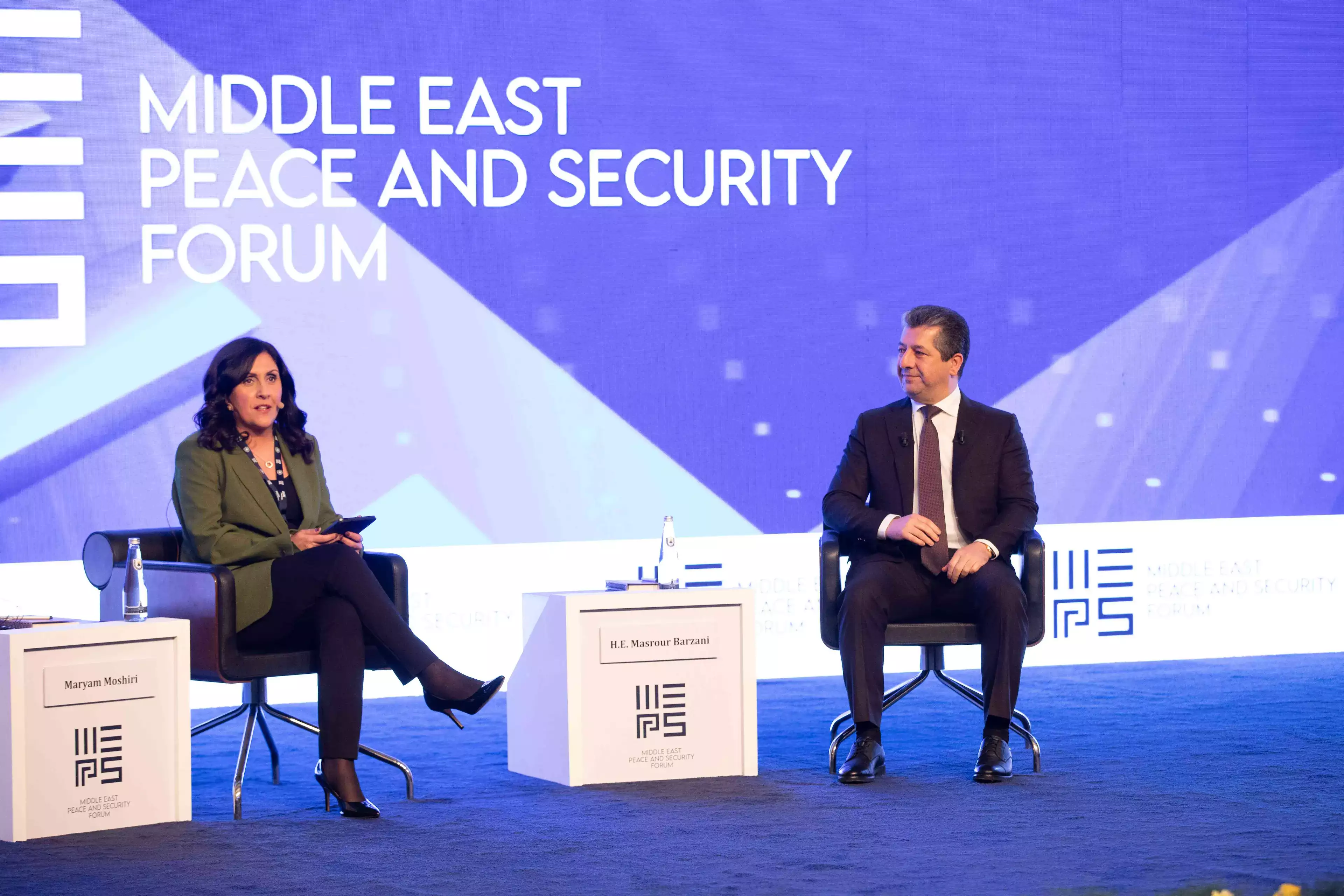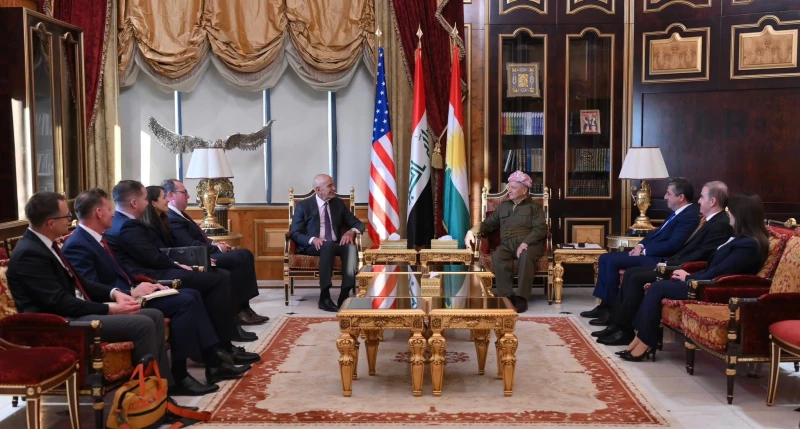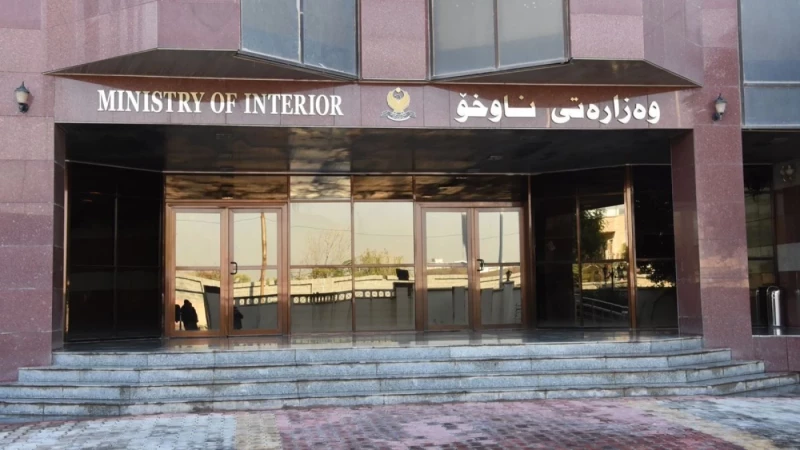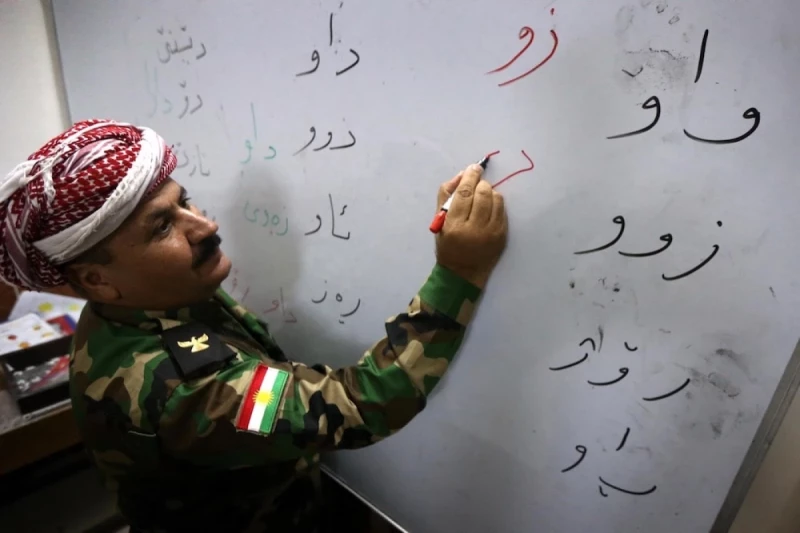DOHUK, Iraq - Prime Minister Masrour Barzani told BBC presenter Maryam Moshiri at the Middle East Peace and Security (MEPS) Forum on Nov. 21 that “we denounce war, and we think that it should not even be the last resort. It should not even be a way to solve any problems.”
To this end, he added, “we need to solve problems before they escalate into military confrontations. Because once it starts, it's hard to predict when it can end and how it will end.”
On the likelihood of Iraq’s involvement in trying to solve the conflict in Gaza, he said that “I think the best thing Iraq can do is to stay away from this conflict. Iraqis have enough problems.”
However, “if there is a way to provide humanitarian assistance, that's fine. And this is what we here in the KRG [Kurdistan Regional Government] are doing. We are trying to, through our charities, try to find some humanitarian aid to send it to the people in need. But unfortunately, there hasn't been any opportunity yet. The authorities in charge haven't opened that gate or that chance for this humanitarian support that we intend to send,” he said.
On Baghdad and blunders
On the recent removal of Iraq’s parliament speaker Mohamed al-Halbousi from his position by the Federal Supreme Court that “I think the timing was wrong. I'm not going to talk about the decision, but the timing definitely wasn't good for Iraq. Why? Well, we have so many different problems, as you know, what we talked about, the whole Middle East now facing this crisis. We have other issues to address. This was an unwanted crisis, an unwanted problem. I think it shouldn't have happened, and if there was any way to address this issue, it should have happened through different channels.”
Barzani went on to discuss other issues evincing a clear divergence of views between Erbil and Baghdad.
“The conflict between Baghdad and Erbil over oil is because the constitution was not interpreted or respected in the sense that it was written. Kurdistan has certain rights in the constitution, which unfortunately have been ignored. Those rights are extraction and production and selling oil,” he said. “And the main question is very clear. Are we a federal state, or is Baghdad a central government? I think that's the fundamental issue. We believe that there needs to be, in a federal state, there needs to be power sharing and distribution of power to the regions as it's stipulated in the constitution.”
“Kurdistan has done everything that is required by the constitution,” he said forcefully. “We have done all of our duties, but we've never enjoyed the rights that we also have in the constitution. Kurdistan has complied with the constitution and the regulations. We have worked with the federal government on the oil sales and on the principles of oil production. But unfortunately, we haven't been receiving the support that we deserve from the federal government and from the federal institutions.”
In explaining further, he noted that “we have contracts with international oil companies. These contracts are valid and legal. And of course, in the KRG, we respect these contracts. But there is a cost for production of oil by these IOCs, because they are the ones that have invested in Kurdistan.”
“So it's not like in Baghdad,” he pointed out, “where they haven't invested in producing oil, but the companies have invested. So they need to have the investment costs, and also the production costs, and also the profit, based on the contract that they have. And there is a price, there is a cost for the production of oil. Unfortunately, Baghdad is talking about a number that is not real. They're introducing $6 for the cost of production for each barrel in Kurdistan. There are similar wells in Kurdistan, for instance, in Qayyarah, that the cost of production for the oil in that well is $34.”
“So how come in another well in Kurdistan, the cost should be $6? So there is a huge difference. And when we confront Baghdad, they say, well, this is an average, because we also have other wells in other parts of the country that is about $1 or $2. True. But my question is, when Baghdad is paying the cost of these wells, are they paying every well or every company $6? Or they're paying each well its own price,” he said.
This is important, he said, and is a key point in the “discussions that we've had with Baghdad” since the Kurdistan Regional Government (KRG) “is the owner of the contracts, it’s the side that has signed the contracts with the IOCs. And this is the right that the KRG has, and we are not going to give that right up.”
Once the actual cost of production is established, he said, “then the export can be done easily because without production, we cannot have export. That's why I'm focusing on the production, that once we have enough production, then we can move into the next stage of exporting oil through Turkey.”
In response to Moshiri’s question on whether he believes exports will resume soon, the PM said “the ball is in Baghdad's court”.
“Are they willing to give the actual cost of production to the IOCs that are operating in Kurdistan? If they are, we can definitely produce and they can produce. We are here regulators as the KRG and we are defending our constitutional rights but we are also defending the rights of our partners that have trusted us and invested in Kurdistan. So once these contracts are respected and once the federal government pays these IOCs then there is oil to be exported,” he noted.
Barzani noted that a delegation from Baghdad had visited the Kurdistan region “last week and it was a very good meeting that they had with the Ministry of Oil. I've had several conversations with the prime minister himself, and he's also very understanding. The ministry is very understanding. So I'm hoping that they would come to some sort of agreement, and we can produce and also export. I cannot tell you when.”
Supporting farmers and stopping civil servants from ‘wasting people’s time’
On diversifying the economy, the Kurdistan PM said: “I heavily invested in agriculture, also in industry, in tourism. And I'm also looking at how we can improve our education and health system.”
He cited “the export of our agricultural goods to the Gulf and to Europe” as a result, noting that “this is encouraging many farmers to go back into farming. We see there is an increase in the agri-products and the revenues generated from it.”
“We are now installing about 1,000 ATMs throughout Kurdistan,” he added. “And we are also installing about 40,000 payment stations so that not only the citizens here of Kurdistan but also visitors coming from outside, they can benefit and use credit cards rather than carrying cash with them.”
“Once you have a system that is controlled, once you have a system that is transparent, once you have a system that is functioning well, and this is exactly what we're doing with this digitalization of the government services and payments,” he stressed, “then you have enough time to go back and look at who has done what, and then you can hold them accountable for their bad behavior.”
However, corruption “in my view, is not just about people cheating and taking money, but it's also about waste of time. The employees, government employees, who are paid to serve people, but they are going and sitting there not doing anything. This is also corruption.”
Climate change and migrating masses
“We already are seeing migration of people from one city to another in Iraq,” where climate change is having devastating effects, Barzani noted.
“But this migration could also happen from country to country, and mainly from this region to Europe, or to the West, or developed countries,” he said, and “if this migration is unacceptable, there is a choice that can be made today. Of course, there are financial responsibilities that everybody has to accept to look at how to address the problem at its origin. If not, when the migration happens, masses of people migrate to different countries. They take with them social, political, economic, and security problems to the host countries.”
‘More women ministers than any previous cabinet’
“The youth are the future of this country,” he went on to say. “And I'm a firm believer that we need to empower the youth and the young talents. And in my office, I now have a staff of about 60-70 very talented young people from different regions that they're working in my office.”
“There are always ambitious people. There are always people who may want to leave the country and seek opportunities elsewhere. It's not only happening in Kurdistan, but it's happening in even the most advanced countries. People travel from one country to another. They're looking at different opportunities in different parts of the world,” he pointed out.
However, “we have more than 100,000 foreign employees in Kurdistan. So if there is no job opportunity here in Kurdistan, how come we would have 100,000 foreign employees that are working in Kurdistan?” he said. “Recently, we have worked with the private sector, and every company that at least 75% of the workforce must be local. So we are increasing this opportunity for job opportunities for people. We are not there yet, but we are trying as hard as we possibly can.”
In response to a question about women, he noted that “in the public sector, we have more women ministers than any other cabinet in the history of Kurdistan government.”
“I don't believe that you need to empower women or give chances to women because of their gender,” he added. “So all we need is to give equal opportunities to men and women. And this is what I'm doing.”
IDPs and Yazidis
Barzani stressed that the Kurdistan Region of Iraq “is hosting now more than 1 million IDPs from other parts of Iraq and about 250,000 refugees from neighboring countries. That speaks volumes about where Kurdistan stands on the rights of different communities.”
Moshiri asked about how his government was going to help the “hundreds of thousands” of Yazidis get back to their home area of Sinjar.
“We have signed an agreement with the federal government of Iraq, and we were hoping that that agreement would be implemented. Unfortunately, it has not been implemented by the federal government because there are elements in Sinjar that are not challenging us here in Kurdistan, but they're also challenging the federal government and the prime minister’s decision himself. So basically, there are elements that are more powerful than the government institutions that are not allowing the agreement to be implemented.”
“And of course, we cannot force anyone to leave Kurdistan to go and live in uncertain conditions. And that's why we will try to push and ask for support that the Sinjar Agreement, in this case, be implemented as it is. And I think that would give a good opportunity for people, the Yazidi people, and not just Yazidi people, to go back to their cities and towns,” he said.
Honesty and justice as priorities
PM Barzani also addressed accusations about an alleged lack of press freedoms in the area under his control.
“I cannot speak for the rest of Iraq, but I'm responsible for Kurdistan, and I can tell you,” he said, that “people criticize, they criticize my government every day, and they're free. There is a difference between chaos and freedom. There is also a difference between freedom of expression and defamation.”
“Obviously, journalism is a very honorable work” and “journalists here in Kurdistan are very active” and influential, he said.
More broadly on his vision for the country, Barzani said that “I think here in Iraq, we as the Kurds feel that there has been a lot of injustice throughout history against our people. Even today, in this Iraq, in the federal Iraq, we don't see justice served.”
“So justice is really the key, but also honesty. Because there are many players who come and talk and deliver speeches and share ideas. They say something, but they do something completely different. I wish that everybody would commit themselves and be honest and deliver to what they promise. I think honesty is really the key. Once you deal with a person, once you deal with an institution or an organization, if you know where they stand and you know what they say, it's exactly what they mean. And that's exactly what they do. Then you can really adjust yourself,” he noted.
“I think in our case, in this region, most of the time, people say things for the audience or for the other side, knowing that this is exactly what they want to hear. But they're not honest in telling the truth. So I think justice and honesty” are the things most needed, he said.



 Facebook
Facebook
 LinkedIn
LinkedIn
 Telegram
Telegram
 X
X


